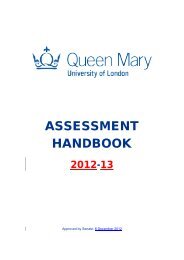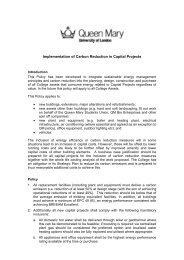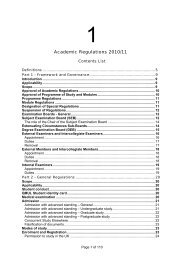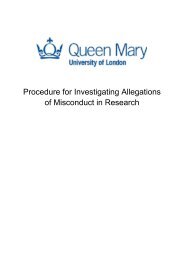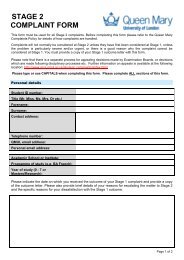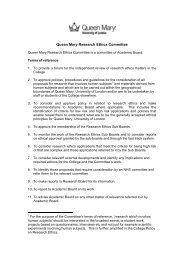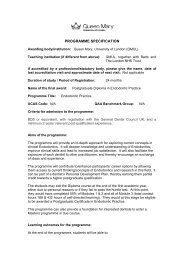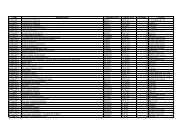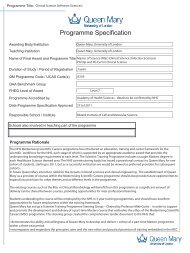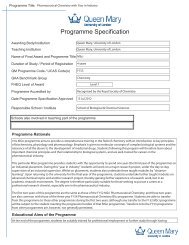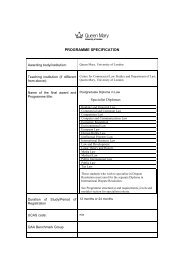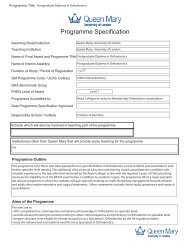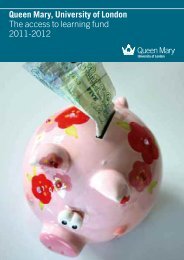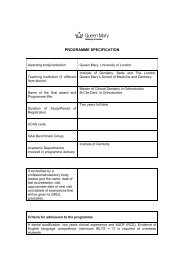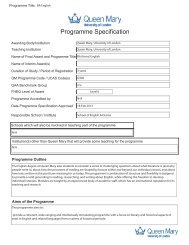Programme Specification - Queen Mary University of London
Programme Specification - Queen Mary University of London
Programme Specification - Queen Mary University of London
You also want an ePaper? Increase the reach of your titles
YUMPU automatically turns print PDFs into web optimized ePapers that Google loves.
<strong>Programme</strong> Title: Pre-Masters Graduate Diploma in Economics and Finance<br />
<strong>Programme</strong> <strong>Specification</strong><br />
Awarding Body/Institution<br />
Teaching Institution<br />
<strong>Queen</strong> <strong>Mary</strong>, <strong>University</strong> <strong>of</strong> <strong>London</strong><br />
<strong>Queen</strong> <strong>Mary</strong>, <strong>University</strong> <strong>of</strong> <strong>London</strong><br />
Name <strong>of</strong> Final Award and <strong>Programme</strong> Title Graduate Diploma in EAP and Economics & Finance<br />
Pre-Masters Graduate Diploma in EAP and Economics & Finance<br />
Name <strong>of</strong> Interim Award(s)<br />
Duration <strong>of</strong> Study / Period <strong>of</strong> Registration<br />
QM <strong>Programme</strong> Code / UCAS Code(s)<br />
QAA Benchmark Group<br />
1 year<br />
Y2QB<br />
n/a<br />
FHEQ Level <strong>of</strong> Award Level 6<br />
<strong>Programme</strong> Accredited by Accreditation UK / The British Council last visit 2011<br />
Next visit in 2015<br />
Date <strong>Programme</strong> <strong>Specification</strong> Approved 1 Oct 2013<br />
Responsible School / Institute<br />
Language Centre, School <strong>of</strong> Languages, Linguistics and Film<br />
Schools which will also be involved in teaching part <strong>of</strong> the programme<br />
School <strong>of</strong> Economics<br />
Institution(s) other than <strong>Queen</strong> <strong>Mary</strong> that will provide some teaching for the programme<br />
<strong>Programme</strong> Outline<br />
The Pre-Masters Graduate Diploma in Economics and Finance <strong>of</strong>fers a route into postgraduate degrees in economics, finance<br />
and related subjects for EU and international students whose academic or linguistic backgrounds do not qualify them for direct<br />
entry.<br />
The subject content and teaching methodology is aimed to prepare students for Masters level study. The programme consists<br />
<strong>of</strong> both academic and English language & study skills modules which are fully assessed and contribute to the final award. The<br />
academic modules are delivered by the School <strong>of</strong> Economics. <strong>Queen</strong> <strong>Mary</strong> <strong>of</strong>fers guaranteed entry to linked degree courses to<br />
students who achieve appropriate grades.<br />
The Pre-Masters <strong>Programme</strong> in Social Sciences and Humanities, from which this programme is drawn, attracts students from all<br />
over the world, and has had increasing numbers since its inception. For example, enrolments have increased from 36 in<br />
2008-09, to 67 in 2012-13. Each year approximately 70% <strong>of</strong> the students on the Economics pathway attain the grades they need<br />
to progress to QM. Most <strong>of</strong> the other students find places in other UKHEIs.
<strong>Programme</strong> Title: Pre-Masters Graduate Diploma in Economics and Finance<br />
Aims <strong>of</strong> the <strong>Programme</strong><br />
The programme aims to <strong>of</strong>fer a route to British HE for EU and International students who do not/may not meet the general<br />
minimum entrance requirements for taught masters degree programmes in economics, finance and related subjects.<br />
It also aims to enhance EU and International students’ potential for success at taught masters level by increasing their subject<br />
knowledge <strong>of</strong> specific academic disciplines, by improving their overall ability in English and by developing their study skills and<br />
to assist them in adjusting to the expectations <strong>of</strong> a UK HE institution.<br />
What Will You Be Expected to Achieve?<br />
Academic Content:<br />
A 1<br />
A 2<br />
A 3<br />
A 4<br />
A 5<br />
A 6<br />
To enable students to develop and demonstrate the academic English language and study skills required for entry to<br />
and potential success in a masters degree programme in economics, finance or related subjects.<br />
To enable students to demonstrate knowledge and understanding <strong>of</strong> the tools and techniques necessary for<br />
understanding the main sources <strong>of</strong> economic information and investigating contemporary economic issues.<br />
To enable students to demonstrate an understanding <strong>of</strong> economic principles so that they will be able to differentiate<br />
between economic models.<br />
To enable students to demonstrate understanding <strong>of</strong> the issues pertaining to global and national economics.<br />
To enable students to demonstrate an understanding <strong>of</strong> choices that businesses must make.<br />
To enable students to demonstrate the knowledge to progress to a Masters degree in economics and/or finance.<br />
Disciplinary Skills - able to:<br />
B 1<br />
B 2<br />
B 3<br />
synthesize ideas and evidence, applying appropriate knowledge and skills flexibly, in order to produce innovative<br />
solutions in research with minimal guidance.<br />
read and think critically in order to question, to examine arguments/ideas, and to evaluate evidence and conclusions<br />
for their reliability and validity.<br />
reflect on and evaluate their thinking and reading skills, using both feedback and self-assessment to raise their<br />
awareness <strong>of</strong> the learning process itself and the skills necessary for success in an academic environment.<br />
Attributes:<br />
C 1<br />
C 2<br />
To write coherently in a variety <strong>of</strong> academic styles (eg argumentative, discursive, critical, persuasive) to the standards<br />
<strong>of</strong> Masters level writing.<br />
To actively engage with academic reading texts through discussion/debate with peers and teachers.
<strong>Programme</strong> Title: Pre-Masters Graduate Diploma in Economics and Finance<br />
C 3<br />
C 4<br />
C 5<br />
C 6<br />
C 7<br />
To study autonomously, using the full range <strong>of</strong> appropriate resources for their discipline available in the College and<br />
in the wider academic community.<br />
To lead and be proactive in discussions, and work effectively in groups.<br />
To grasp the principles and practices <strong>of</strong> the field <strong>of</strong> study.<br />
To produce analyses which are grounded in evidence.<br />
To use effective spoken and written English with confidence.<br />
How Will You Learn?<br />
The principal strategy for learning is to <strong>of</strong>fer a carefully staged and appropriately supported introduction to the modes <strong>of</strong> course<br />
delivery and types <strong>of</strong> assessment currently in use in UK higher education, and to ensure that on completion <strong>of</strong> the course<br />
students possess the academic knowledge, language and study skills to make a successful transition to university study.<br />
Attendance is compulsory and sustained absences from class will be dealt with according to the policy <strong>of</strong> the Graduate Diploma<br />
(students receive two written warnings – after 20 and 40 absences – followed by deregistration if attendance does not improve).<br />
Students who are more than fifteen minutes late for class will be classified as absent.<br />
The module will be taught using the following methods:<br />
• Lectures<br />
• Seminars<br />
• Readings<br />
• Viewings<br />
• Listening exercises<br />
• Written exercises<br />
• Student presentations<br />
• Student written assignments.<br />
How Will You Be Assessed?<br />
The programme uses Continual Assessment (eg. coursework, assessed seminars and presentations, in-class tests, and extended<br />
writing on research conducted by the student) and Written Examination Papers.<br />
How is the <strong>Programme</strong> Structured?<br />
The Graduate Diploma is a fully credit-bearing programme at Level 6. To successfully complete the programme, students must<br />
complete 120 credits, at least 90 <strong>of</strong> which must be at Level 6, and up to 30 <strong>of</strong> which can be Level 4 or 5.<br />
All students take English Language and Study Skills as a core module and two other compulsory modules in Economics and<br />
Finance, and Quantitative Techniques.<br />
The Graduate Diploma in Economics and Finance will have the same academic credit requirements as the Pre-Masters Diploma,<br />
which was approved by the Academic Board for at its meeting in March 2010. The award regulations for the Pre-Masters Diploma<br />
appeared in the Academic Regulations 2010-2011, as follows:<br />
Progression and award regulations for Pre-Masters Diploma
<strong>Programme</strong> Title: Pre-Masters Graduate Diploma in Economics and Finance<br />
Eligibility for award<br />
To be eligible for the award <strong>of</strong> Pre-Masters Diploma a student must have:<br />
i. Met the requirements for the approved programme for which he/she is registered.<br />
ii. Met the requirements for the duration <strong>of</strong> registration.<br />
iii. Taken the required total credit value for the award.<br />
iv. Met the minimum credit value at the level <strong>of</strong> the award.<br />
v. Not exceeded the maximum credit value at the lowest level <strong>of</strong> the award.<br />
Academic credit requirements<br />
To be eligible for award <strong>of</strong> Pre-Masters Diploma students are required to;<br />
i. Take modules to a total value <strong>of</strong> 120 credits during one developmental year.<br />
ii. Take modules to a minimum value <strong>of</strong> 90 credits at academic level 6.<br />
iii. Take modules to a maximum value <strong>of</strong> 30 credits at level 4.<br />
iv. Pass modules to the value <strong>of</strong> 90 credits.<br />
Classification <strong>of</strong> award<br />
The classification <strong>of</strong> award is based on the College Mark. The College Mark provides a weighted average <strong>of</strong> all modules taken by<br />
a student. In all cases, the College Mark is calculated as though the required value <strong>of</strong> academic credit was taken.<br />
The College Mark is calculated to one decimal place and presented to the SEB and DEB as such.<br />
The classification <strong>of</strong> the Pre-Masters Diploma is made according to the following scale:<br />
College Mark <strong>of</strong> 70% to 100% - Distinction<br />
College Mark <strong>of</strong> 65% to 69.9 - Merit<br />
College Mark <strong>of</strong> 40% to 64.9% - Pass<br />
Academic Year <strong>of</strong> Study 1<br />
Module Title<br />
English Language and Study Skills<br />
(Graduate Diploma)<br />
Module<br />
Code<br />
Credits<br />
Level<br />
Module<br />
Selection<br />
Status<br />
Academic<br />
Year <strong>of</strong><br />
Study<br />
Semester<br />
IFC6007 60 6 Core 1 Semesters 1 & 2<br />
Quantitative Techniques IFC6003 30 6 Compulsory 1 Semesters 1 & 2<br />
Economics and Finance IFC6004 30 6 Compulsory 1 Semesters 1 & 2<br />
What Are the Entry Requirements?<br />
A full first degree at the equivalent <strong>of</strong> at least a Pass in a UK undergraduate degree, or (for students from PR China) a three year<br />
diploma from a recognised institution, with grades <strong>of</strong> at least 75% in relevant subjects.<br />
Evidence <strong>of</strong> English language pr<strong>of</strong>iciency:<br />
IELTS overall 5.5, with a minimum <strong>of</strong> 5.5 in Writing, Reading, Speaking and Listening, or<br />
TOEFL iBT overall 72, with a minimum <strong>of</strong> 17 in Writing, 18 in Reading, 17 in Listening and 20 in Speaking, or
<strong>Programme</strong> Title: Pre-Masters Graduate Diploma in Economics and Finance<br />
PTE Academic overall 51, with a minimum <strong>of</strong> 51 in Writing, Reading, Speaking and Listening.<br />
How Do We Listen and Act on Your Feedback?<br />
The Staff-Student Liaison Committee provides a formal means <strong>of</strong> communication and discussion between schools/institutes and<br />
its students. The committee consists <strong>of</strong> student representatives from each year in the school/institute together with appropriate<br />
representation from staff within the school/institute. It is designed to respond to the needs <strong>of</strong> students, as well as act as a forum<br />
for discussing programme and module developments. Staff-Student Liaison Committees meet regularly throughout the year.<br />
Each school/institute operates a Learning and Teaching Committee, or equivalent, which advises the School/Institute Director <strong>of</strong><br />
Taught <strong>Programme</strong>s on all matters relating to the delivery <strong>of</strong> taught programmes at school level including monitoring the<br />
application <strong>of</strong> relevant QM policies and reviewing all proposals for module and programme approval and amendment before<br />
submission to Taught <strong>Programme</strong>s Board. Student views are incorporated in the committee’s work in a number <strong>of</strong> ways, such as<br />
through student membership, or consideration <strong>of</strong> student surveys.<br />
All schools/institutes operate an Annual <strong>Programme</strong> Review <strong>of</strong> their taught undergraduate and postgraduate provision. APR is a<br />
continuous process <strong>of</strong> reflection and action planning which is owned by those responsible for programme delivery; the main<br />
document <strong>of</strong> reference for this process is the Taught <strong>Programme</strong>s Action Plan (TPAP) which is the summary <strong>of</strong> the<br />
school/institute's work throughout the year to monitor academic standards and to improve the student experience. Students’<br />
views are considered in this process through analysis <strong>of</strong> the NSS and module evaluations.<br />
Academic Support<br />
Each student has a personal tutor, who is their main English language and study skills teacher. Individual tutorials are scheduled<br />
for 30 minutes fortnightly, but students can request to see their tutor additionally outside this schedule if required.<br />
Students attend a compulsory one-week induction in Week 0 <strong>of</strong> Semester 1. During this, students are given help in enrolling and<br />
paying fees as well as attending sessions on programme details, academic options, health and safety and additional sessions<br />
<strong>of</strong>fered by the Advice and Counselling Service.<br />
<strong>Programme</strong>-specific Rules and Facts<br />
n/a<br />
Specific Support for Disabled Students<br />
<strong>Queen</strong> <strong>Mary</strong> has a central Disability and Dyslexia Service (DDS) that <strong>of</strong>fers support for all students with disabilities, specific<br />
learning difficulties and mental health issues. The DDS supports all <strong>Queen</strong> <strong>Mary</strong> students: full-time, part-time, undergraduate,<br />
postgraduate, UK and international at all campuses and all sites.<br />
Students can access advice, guidance and support in the following areas:<br />
• Finding out if you have a specific learning difficulty like dyslexia<br />
• Applying for funding through the Disabled Students' Allowance (DSA)<br />
• Arranging DSA assessments <strong>of</strong> need<br />
• Special arrangements in examinations<br />
• Accessing loaned equipment (e.g. digital recorders)<br />
• Specialist one-to-one "study skills" tuition<br />
• Ensuring access to course materials in alternative formats (e.g. Braille)
<strong>Programme</strong> Title: Pre-Masters Graduate Diploma in Economics and Finance<br />
• Providing educational support workers (e.g. note-takers, readers, library assistants)<br />
• Mentoring support for students with mental health issues and conditions on the autistic spectrum.<br />
Links With Employers, Placement Opportunities and Transferable Skills<br />
n/a Students from this programme progress to postgraduate degrees, rather than enter the workplace.<br />
<strong>Programme</strong> <strong>Specification</strong> Approval<br />
Person completing <strong>Programme</strong> <strong>Specification</strong><br />
Simon Pate<br />
Person responsible for management <strong>of</strong> programme Simon Pate<br />
Date <strong>Programme</strong> <strong>Specification</strong> produced/amended<br />
by School Learning and Teaching Committee<br />
Date <strong>Programme</strong> <strong>Specification</strong> approved by<br />
Taught <strong>Programme</strong>s Board<br />
8.2.2013<br />
1 Oct 2013



